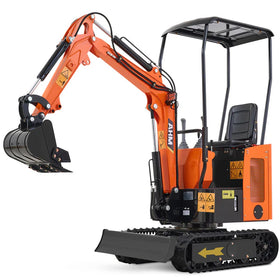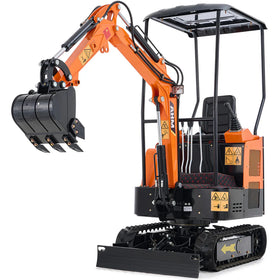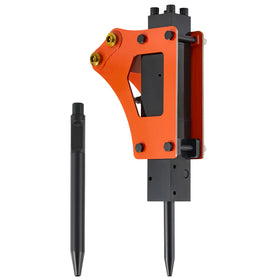When considering a mini excavator for sale or rental, understanding the full cost is crucial. This guide breaks down the expenses associated with mini excavators, from purchase and rental prices to ownership costs.

1. Purchase Costs: Buying a Mini Excavator
The cost to buy a mini excavator varies based on several factors:
|
Factor |
Price Range |
|
New 1-ton model |
$10,000 - $20,000 |
|
New 3-ton model |
$20,000 - $30,000 |
|
New 6-ton model |
$40,000 - $800,000 |
|
Used mini excavator |
$10,000 - $20,000 |
Prices for brands like Kubota mini excavators typically fall within these ranges, often at the higher end due to their reputation for quality. (AHM offers a compelling alternative that uses Kubota-designed engines, providing similar power and reliability at a more affordable price point.)
Factors affecting purchase price:
- Brand and model
- Size and capacity
- New vs. used condition
- Additional features or attachments
2. Rental Costs: How Much to Rent a Mini Excavator
For those not ready to buy, renting is an option. How much to rent a mini excavator depends on several factors:
|
Rental Period |
Typical Cost Range |
|
Daily |
$200 - $500 |
|
Weekly |
$1,000 - $2,000 |
|
Monthly |
$3,000 - $5,000 |
Factors affecting rental prices:
- Size and capabilities of the machine
- Duration of rental
- Local market demand
- Seasonal variations
3. Hidden Costs of Ownership
Beyond the initial purchase, consider these ongoing expenses:
|
Expense Category |
Annual Cost Estimate |
|
Insurance |
$500 - $2,000 |
|
Routine Maintenance |
$1,000 - $3,000 |
|
Fuel (varies with usage) |
$2,000 - $5,000 |
|
Storage (if needed) |
$1,200 - $6,000 |
Additional costs to consider:
- Attachments: $1,000 - $5,000 each
- Operator training: $500 - $2,000 per operator
- Unexpected repairs: Variable, but budget for contingencies
4. Weight Considerations
Understanding how much a mini excavator weighs is crucial for transportation and site access:
|
Size Category |
Typical Weight Range |
|
1-2 ton |
2,000 - 4,000 lbs |
|
3-4 ton |
6,000 - 8,000 lbs |
|
5-6 ton |
10,000 - 15,000 lbs |
Weight impacts:
- Transportation requirements and costs
- Site accessibility
- Operational costs (fuel consumption)
5. Factors Influencing Overall Cost
Several factors can impact the total cost of owning or renting a mini excavator:
- Location: Demand and laws cause prices to differ by region.
- Seasonal Demand: During the busiest building seasons, rental prices may rise.
- Technology services: Expenses may rise for more sophisticated services like GPS tracking.
- Environmental Regulations: Costs are impacted by adherence to emissions regulations.
- Operator Skill: Fuel and maintenance expenses can be decreased through efficient operation.
6. Cost-Saving Tips
To manage mini excavator costs effectively:
- Compare Multiple Dealers: When looking for a mini excavator for sale, get quotes from several dealers.
- Consider Long-Term Rentals: For extended projects, long-term rentals may offer better rates.
- Invest in Maintenance: Regular upkeep prevents costly repairs and extends machine life.
- Optimize Usage: Choose the right size for your needs to reduce fuel and wear costs.
- Explore Financing: For purchases, compare financing terms to find the best long-term value.
- Plan for Transportation: Coordinate multiple jobs in an area to reduce transport costs.
- Train Operators: Well-trained operators work more efficiently and cause less wear on the machine.
7. Making the Right Choice: Purchase vs. Rental
Deciding whether to buy or rent depends on your specific situation:
Consider Purchasing If:
- You have consistent, long-term projects
- You have storage and transportation capabilities
- You can handle maintenance and repairs
- The machine will be used frequently (more than 60-70% of the time)
Consider Renting If:
- Your projects are infrequent or short-term
- You need different sizes for various projects
- You lack storage or transportation means
- You prefer fixed costs without maintenance worries
8. The True Cost of Ownership
To calculate the true cost of ownership, consider this formula:
Total Cost of Ownership = Purchase Price + Operational Costs + Maintenance Costs - Resale Value
Operational Costs include fuel, insurance, and transportation. Factor in these costs over the expected lifespan of the machine (typically 5-10 years) to get a clear picture of long-term expenses.
9. Competitive Options: AHM Mini Excavators

When exploring the market for mini excavators, it's worth considering AHM Corp's offerings. Known for our competitive pricing.
Some key benefits of AHM mini excavators include:
- Competitive purchase prices compared to industry standards
- 15% lower ownership costs with industry-low prices and minimal upkeep costs
- More affordable mini excavator attachments
When considering the total cost of ownership, AHM's offerings present a compelling option for budget-conscious buyers without compromising on performance or reliability.
Conclusion: Balancing Cost and Value
When assessing mini excavator costs, consider both immediate expenses and long-term value. Whether you're eyeing a mini excavator for purchase or exploring rental options, understanding the full cost spectrum will help you make an informed decision.
Remember, the cheapest option isn't always the most cost-effective in the long run. Factor in reliability, efficiency, and after-sale support when making your choice. By carefully considering all aspects of mini excavator costs, you can select a machine that offers the best balance of performance and value for your specific needs.
Ultimately, the right choice depends on your project requirements, financial situation, and long-term plans. Whether you decide to buy or rent, a mini excavator can be a valuable asset for your construction or landscaping projects, providing efficiency and versatility that can significantly boost your productivity.







